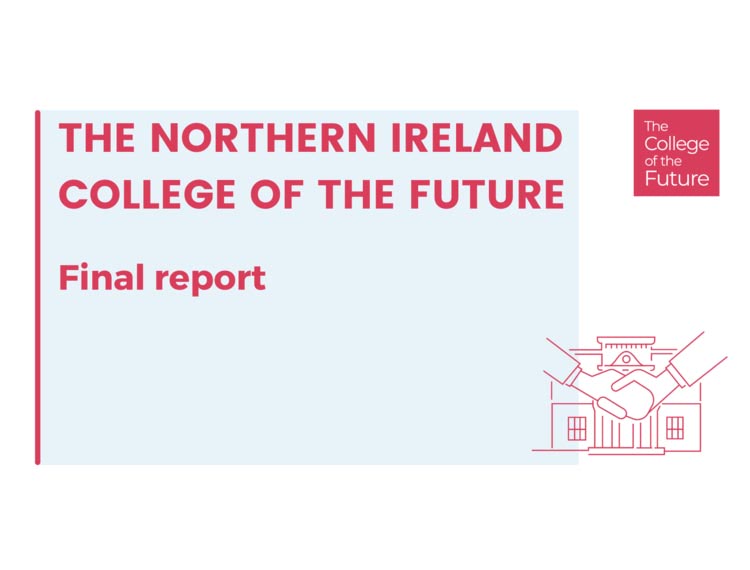The Northern Ireland College of the Future: Transforming skills system is key to unlocking Northern Ireland’s potential

In the wake of the pandemic and as Northern Ireland works to re-ignite its economy, a new report from experts in education and business is arguing for a bold acceleration of measures to better capitalise on the power of colleges. They believe this will support the economically inactive and drive a more prosperous and innovative future.
The Northern Ireland College of the Future report argues that colleges are the vehicles to regionally balance the economy, support businesses to adapt to a green and digital economy and provide better skills opportunities for those out of work. It adds that to deliver on a higher ambition for skills, recognition of their unique role and sustainable investment are needed.
As Learning & Work Institute reported recently, on current trajectories Northern Ireland stands to lag further behind on learning and skills and could have the fourth highest proportion of low qualified people out of 16 OECD countries by 2030.
Today’s report from the Independent Commission on the College of the Future recognises the challenges facing the labour market, now and in the future. It affirms and builds on the detailed analysis from the OECD last summer, supporting the direction of travel in Northern Ireland but calling for a fundamental shift in the role of colleges within the education and skills system and how colleges work collaboratively with schools and universities.
In anticipation of the Executive’s Skills Strategy consultation, the commission is calling for the Executive to put colleges at the heart of economic policy. The group of experts believe that by implementing their recommendations it would kick-start the Northern Ireland recovery and deliver a joined-up approach on jobs, the green transition, and social inclusion.
Main recommendations for the college of the future in Northern Ireland include:
- Establishing a central oversight body and a skills advisory board to support the effective implementation, coordination, and oversight of a higher ambition for skills.
- Developing a single governance structure across Northern Ireland colleges to streamline accountability and funding and maximise the impact of colleges across all aspects of the Northern Ireland economy and society.
- Investing sustainably in colleges to (a) redress historical inequalities between college funding and that of schools and universities, and to (b) maximise colleges’ contribution to business and community support through uncoupling funding from the headcount of individual students.
- Committing to a statutory right to lifelong learning to ensure that everyone can access learning when they need it and developing and implementing a digital action plan with a network of ‘community hubs’ to address digital exclusion.
- Defining what colleges and universities deliver to avoid unnecessary competition and duplication and to allow for the improvement of curriculum pathways, progression routes and careers advice and guidance across schools, colleges and universities.
9 Recommendations for a nation-specific post 16 education and skills strategy in Northern Ireland |
|
Recommendation 1 – Strategic oversight |
|
Recommendation 2 – A Single Coherent College Structure |
|
Recommendation 3 – Creating an Integrated Tertiary System |
|
Recommendation 4 – Funding and Accountability |
|
Recommendation 5 – A statutory right to lifelong learning |
|
Recommendation 6 – Digital transformation |
|
Recommendation 7 – Shared Services |
|
Recommendation 8 – 14-19 Education |
|
Recommendation 9 – College workforce and leadership |
The Commission has learnt a significant amount from the college system in Northern Ireland in its pursuit of setting a common vision for the future of colleges across the UK’s four nations.
It argues that the previous restructuring of the college network, and its close alignment with the Department for the Economy in delivering the Executive’s policy, agenda means that colleges play a more developed role in wider economic development and regeneration than other systems in the UK.
Dr Stephen Farry MP, Member of Parliament for North Down and member of the Independent Commission on the College of the Future, said:
“Colleges in Northern Ireland are leading the way in working together for the common good. Skills are essential to individual opportunity and the success of our economy. They are uniquely placed to provide a dual function of economic support alongside social inclusion.
“Through the Commission’s vision and recommendations being brought to life, colleges will even better be able to respond to local circumstances and the needs of employers. Furthermore, to recover from the impact of the pandemic, the strength and flexibility of colleges is essential.”
 Jackie Henry, Chair of the Skills Strategy Advisory Group, Deloitte UK Consulting People & Purpose Lead and NI Office Senior Partner, said:
Jackie Henry, Chair of the Skills Strategy Advisory Group, Deloitte UK Consulting People & Purpose Lead and NI Office Senior Partner, said:
“This timely and welcome report powerfully shows the strength of the college system in Northern Ireland and the opportunity to further capitalise on their role in supporting businesses and driving prosperity. A highly skilled workforce is an essential component of economic recovery and of economic success in the future.
“It is what attracts companies from across the UK, Europe and the globe to invest in Northern Ireland. To kick-start economic recovery in Northern Ireland and build a more competitive, inclusive and greener economy, colleges must be seen as a vehicle for a brighter future. By further investing in skills and continuing to grow the strategic potential of colleges, I am confident that we will have the people and innovative practices to succeed in the globally competitive market.”
 Brian Doran, Principal and Chief Executive of Southern Regional College, said:
Brian Doran, Principal and Chief Executive of Southern Regional College, said:
“I welcome the publication of the commission’s report at such a critical time for the future of Further Education in Northern Ireland. The commission rightly highlights the tremendous work undertaken by colleges in recent years and the influence that this has had in redefining the role of Further Education across other parts of the UK.
“I welcome the commission’s prioritisation of skills and the assertion that colleges must be front and centre in the drive to address skills imbalances, improving productivity and innovation particularly in our SME sector and in providing opportunities through lifelong learning for all citizens. There is much to ponder in the report including the need for sustainable funding for colleges and I sincerely hope that this report will generate further debate and action within the sector and further afield.”
 Mark Huddleston, Director of jheSOLUTIONS Limited, said:
Mark Huddleston, Director of jheSOLUTIONS Limited, said:
“FE colleges in Northern Ireland have become an integral partner for many businesses. From apprenticeships and a broad range of skills interventions, both technical and soft skills, through to innovation partnerships for micro SME and start-ups.
“The focus on project based learning, entrepreneurship and business skills by the sector means FE students are well prepared for the modern, knowledge based economy. The colleges of the future must continue to be strategic partners to businesses as the economy and world of work changes at pace.”
 Ellen Fearon, NUS-USI President, said:
Ellen Fearon, NUS-USI President, said:
“NUS-USI welcomes this new vision for the College of the Future. Colleges play a central role in our communities and as we begin to build back better after Covid-19, we need to ensure they are able to thrive, providing access to education and skills for all.
“It’s vital that colleges, Students’ Unions and our students receive the funding required to build a strong and equitable education system that enables individuals to develop as both learners and citizens. Colleges are at the very heart of our community, and we need the Executive’s Skills Strategy to reflect that.”
 Robin Ghurbhurun, Managing Director of FE and Skills at Jisc and Commission expert panel member, said:
Robin Ghurbhurun, Managing Director of FE and Skills at Jisc and Commission expert panel member, said:
“This report sets out a bold and ambitious vision for the further education landscape in Northern Ireland. Recognising the changing nature of technology and how it impacts job roles, we welcome the report’s recommendation to implement a digital action plan with a network of ‘community hubs’ to address digital exclusion. This will support the current and future workforce to meet the UK’s requirement for technical skills. We also welcome the focus on supporting businesses to adapt to a green and digital economy and provide better skills opportunities for those out of work. Staff capabilities are fundamental to this ambition and Jisc’s own research highlights the pressing need to support teachers with digital skills, to improve delivering engaging online teaching, as we move into future that blends digital and in-person learning. With the right investment, Northern Ireland’s colleges can help make technology-enhanced education the norm, rather than the exception.”
The foreword is authored by Jackie Henry, Chair of the Skills Strategy Advisory Group, Deloitte UK Consulting People & Purpose Lead and NI Office Senior Partner.
The launch event is taking place via Zoom on Thursday 25 March, 2-3pm.
The Independent Commission on the College of the Future – launched in Spring 2019 – is asking two simple but fundamental questions:
- What do we want and need from colleges across the UK in 10 years’ time?
- What changes are needed in order to achieve this?
Chaired by the UK’s National Statistician Sir Ian Diamond, the Commission is leading the conversation on how colleges can play an expanded role for people, employers and communities to meet the challenges we face in the next decade. The Independent Commission on the College of the Future is made up of leaders from across business, academia, unions, colleges, and the student body from all four nations. The Independent Commission has hosted or presented at over 150 events across the UK, including with senior college leaders, governors, staff and students, employers, universities, schools, local, regional and national governments, unions and many others.
The Independent Commission has benefited from learnings across the four nations of the UK, drawing lessons and insights from reform trajectories and from exemplary institutional practices.
Key stages in our work:
- Hosted or presented at over 150 events across the UK, including with senior college leaders, governors, staff and students, employers, universities, schools, local, regional and national governments, unions and many others.
- Invited international experts from the Basque Country, Ireland, Finland, Slovenia, the Netherlands and the Organisation for Economic Co-operation and Development (OECD) to contribute to the Commission’s thinking – including with a public seminar held jointly with the British Academy in September 2019, with over 100 stakeholders and members of the public.
- Published a Progress Report – reflecting themes emanating from early engagement – with a consultation process in November 2019, receiving over 60 responses from a wide range of organisations and individuals.
- Published the Commission’s vision for the college of the future in July 2020, accompanied by a set of essays from education and skills experts.
- Published a report exploring the relationship between the NHS and the English college system in September 2020 – as an example of how the Commission’s thinking can drive change with this important employer.
- Published our final UK-wide report in October 2020.
- Published nation-specific report for England (November 2020)
- Published nation-specific report for Scotland (December 2020)
- Published nation-specific report for Wales (January 2021)
- Published nation-specific report for Northern Ireland (March 2021).This is the fourth and final of our nations-specific reports.
The Independent Commission is kindly supported by 9 organisations: Association of Colleges, City & Guilds, Colleges Scotland, Colleges Wales, FETL, Jisc, NOCN, NCFE and Pearson.












Responses